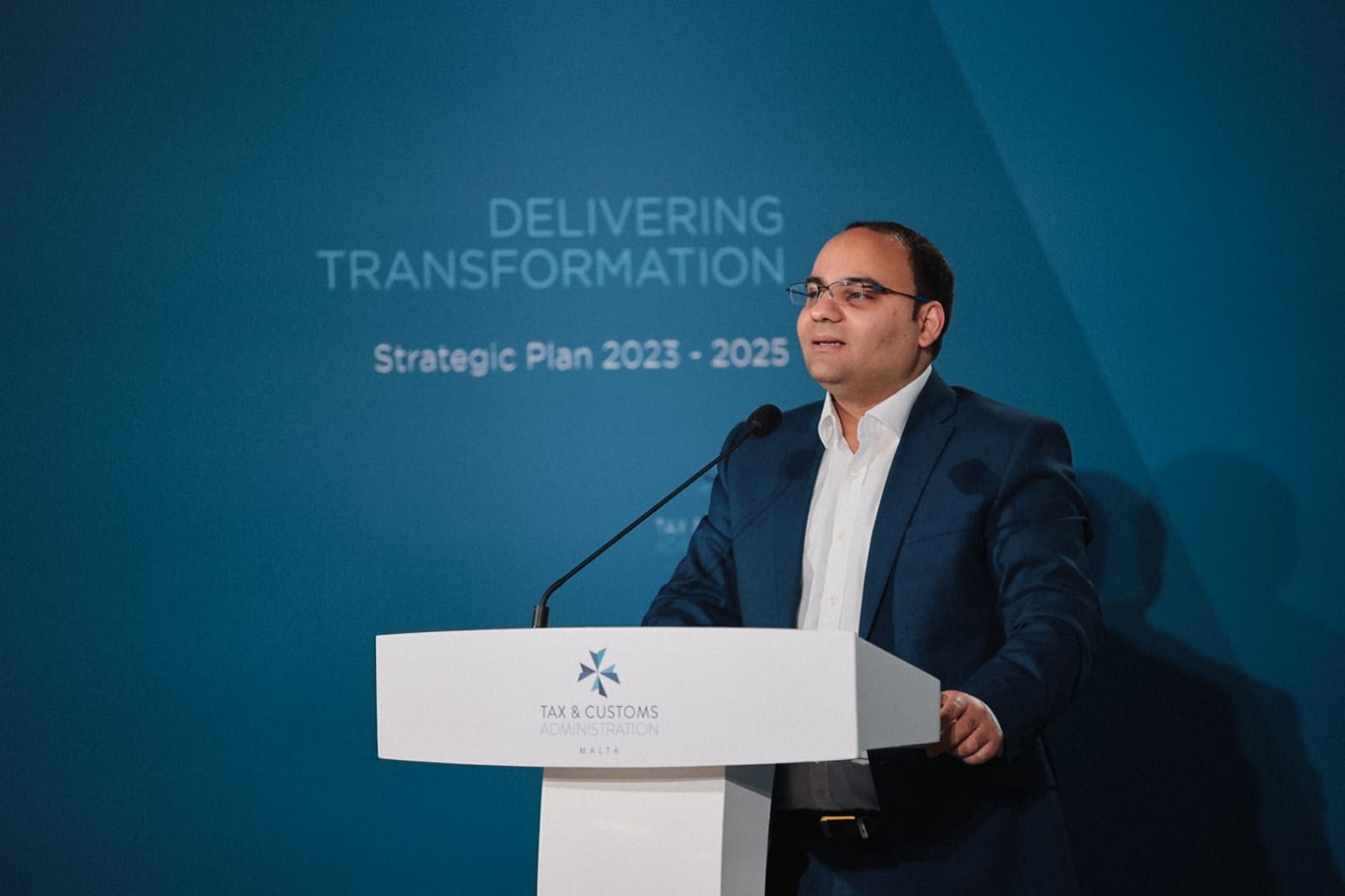Malta’s top business organisations have welcomed the major reform in the country’s tax collection systems unveiled by Finance Minister Clyde Caruana earlier this month, citing it as a positive measure that likely lays the groundwork for an eventual decrease of Malta’s income tax rate for corporations, which is currently the highest in Europe.
The reform includes the merger of the income tax, VAT and customs departments and the introduction of an AI-powered system to catch tax cheats, expected to make tax officials’ life significantly easier.
The move is understood to be an essential precursor to any reform in Malta’s highly attractive tax regime for non-residents, with Minister Caruana admitting, during the announcement of the reform, that “an increase in compliance and efficiency would also allow Malta’s tax burden to remain relatively low in comparison to European counterparts”.
With the reform promising to be the biggest change in tax collection in a generation, BusinessNow.mt reached out to Malta’s leading business representative organisations to see what they think about the issue.
Abigail Agius Mamo, CEO of the Malta Chamber of SMEs, says the lobby believes “it is essential for the country to have an organised and robust tax collection system, and feel this exercise has been done professionally and augurs to result in significant improvements in this regard.”
She continues: “We are in favour of a fair system, whereby businesses pay the taxes that they are due to pay. What business is afraid of, and what we are against, is not a system that is effective in doing what it should be doing, but a system that is strong with the weak and weak with the strong – a system that discriminates based on who one is.”

Malta Institute of Taxation chief technical officer Sarah Cassar Torreggiani says it “in principle welcomes an initiative for the strategic transformation of the Office of the Commissioner for Revenue”, but declined to give further comment pending further review of the strategic plan.
An opportunity to reduce tax
The Malta Chamber president Chris Vassallo Cesareo says the oganisation hopes that “a smarter tax collection system will increase compliance and true and fair reporting of earnings, as this would spread the tax burden more evenly across all businesses”.
He agrees with Minister Caruana, saying that a “higher level of compliance will enable us to push for a more reasonable tax rate by European standards. The current 35 per cent is the highest in the EU, which is unfair for businesses that report their earnings correctly.”
Ms Agius Mamo similarly suggests that “it would be a good move” to use the increased revenues as an opportunity to lower corporate tax rates, which she said would leave businesses with more liquidity to invest further.
“It is historically proven that tax collection is more effective when taxes are reduced. The Government should think on broader principles of a fairer tax system and one which is also incentive-driven. Lowering corporate tax was also an electoral promise.”
Going beyond taxation
Asked how the change could be expected to impact Malta’s businesses, Mr Vassallo Cesareo argues that “those that have their house in order and pay their dues should be happy to see more efficiency and fairness in tax collection. The Malta Chamber is all for a level playing field in all aspects of doing business, including payment of taxes.”

He however also insists that the reform must not stop there: “We also expect the new system to provide for the offsetting of different taxes against each other as we have been proposing for years. That way, when businesses are owed a refund of any form of tax, it is immediately offset against other tax dues. This would help improve cashflow for businesses that pay their taxes promptly.”
Pointing to The Malta Chamber’s pre-electoral recommendations, Mr Vassallo Cesareo says the organisation is in favour of “positive discrimination” in favour of tax abiding businesses.
“This principle should apply particularly in public procurement as it is unacceptable that taxes collected from law abiding businesses and citizens are used to fund procurement from businesses that do not pay their fair share.”
On fairness

Ms Agius Mamo says it is “difficult” to comment on the proposal without clear details, but urged the authorities to implement it in a just manner: “The way Government chooses to implement measures makes a very big difference in terms of impact. As long as the system is implemented in a just manner, we are sure it will bear fruit.”
“Any changes need to be well planned,” agrees Joanne Bondin, president of the Malta Employers’ Association (MEA). “We welcome any efforts made to strengthen good governance and promote transparency, and the MEA expect that such policies will be enforced equally to ensure that a fair level playing field will be offered to all organisations.”
What about those companies paying no tax?
Asked to comment on Minister Caruana’s shocking revelation that 70 per cent of businesses do not post profits and therefore pay no tax, both The Malta Chamber and the Chamber of SMEs expressed disdain for those who try to game the system.

“There are businesses that pay taxes as due, and others that don’t,” says Mr Vassallo Cesareo. “Those who don’t might be tempted to increase prices to make up for having to pay more tax, but this would make them less competitive than those who are already paying their taxes. Then it is up to the consumer to choose which businesses to support.”
Ms Agius Mamo describes the number as “so high it is difficult to fathom”, adding that the SME Chamber hopes that the Ministry is digging deeper: “We believe that if an in-depth analysis is carried out, answers will be found, and these will be much easier to comprehend. In the absence of this we are left with a very ugly picture that does not only reflect badly on business, but equally so on the authorities.”
As for the business community’s expectations, Mr Vassallo Cesareo sums it up: “An efficient system of tax collection has been promised for years. Our members will believe it has really been implemented when they see it working.”
‘Don’t underestimate the war’
The update to Malta’s tax code has long been on the agenda of European governments eager to limit the paths available to businesses to pay less tax, but previous attempts never generated enough steam.
Malta’s position on the matter became less tenable once the UK, also a major defender of individual nations’ right to set their own tax rates, left the European Union, and the large drain on public coffers caused by many countries’ pandemic support schemes made the issue more pressing than ever.
The final hammer blow seems to have come from Russia’s invasion of Ukraine. Speaking at a conference organised by the Institute of Financial Services Practitioners, the Minister stressed that the industry “must not underestimate the war and how it has completely changed the European frame of mind”.
He continued: “Until a few years ago, everyone was working on their own and it was very difficult for the EU to get things done. But the bindings of the union have been rediscovered and there is more impetus being place on European identity.”
Minister Caruana shared that European enlargement is back on the agenda, which has led to the reopening of the debate on the bloc’s voting rules. Currently, each member state carries a veto, but this has proven increasingly unwieldy as more countries joined the EU. The loss of the veto would severely hamper Malta’s ability to shut the door on changes it deems to go against its strategic interests – like tax reform.
‘Gozo expansion has always been on the cards’ – Darscover CEO
Joe Ellul Turner discusses how Darscover’s expansion into Gozo will bring data-driven innovation to the island’s property market
Women now make up 61% of full-time University of Malta students
Women have been consistently outnumbering men in full-time tertiary education
Digital security firm ESET recognised as a ‘Notable Provider’ in Forrester’s European MDR Report
Territory Sales Manager Costas Georgiades highlights the company’s blend of regional expertise, rapid response, and intelligence-driven cybersecurity services






